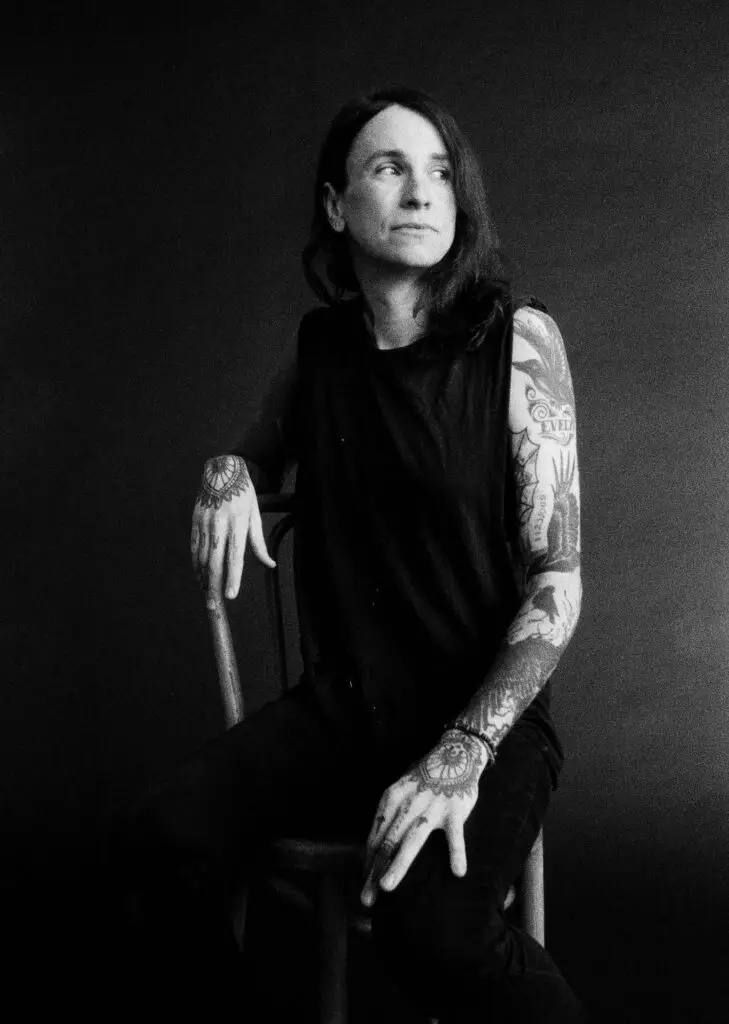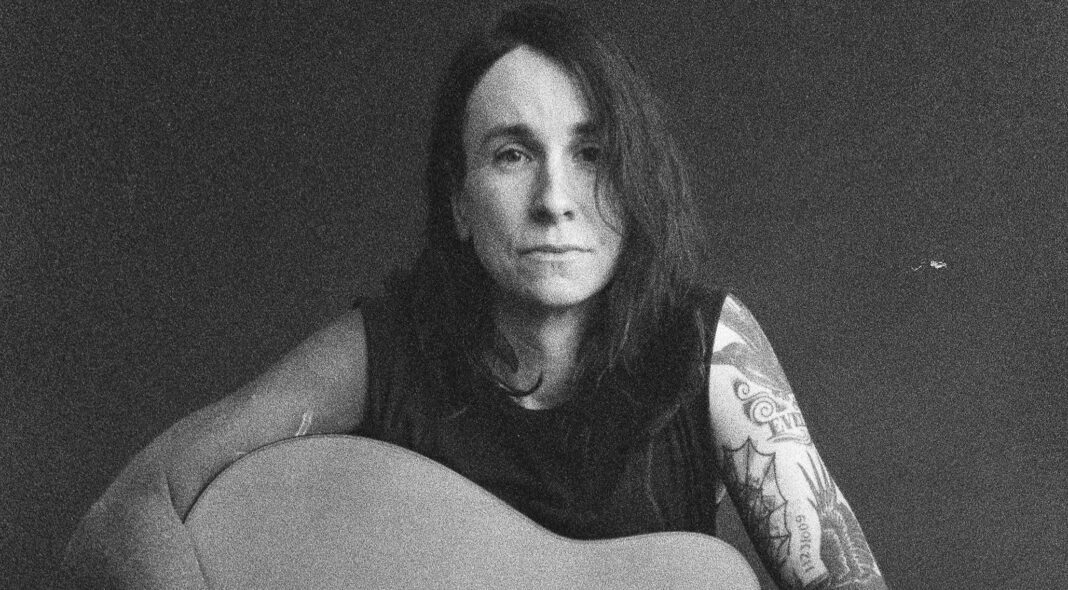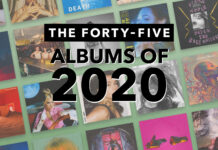Three days into a new tour with her primary band Against Me!, Laura Jane Grace found herself interrupted by a global pandemic. All immediate plans cancelled, the 39-year-old punk returned to Chicago, where she lives, and stared down the barrel of nothingness and the biggest test of patience. It was the first time in more than 20 years that she had experienced this much time off-the-road with no foreseeable plans to return to it. With about 30 songs already written (intended for a future Against Me! Record), the frontperson realised that there was a need for these songs to be recorded and that need was bigger than just her own salvation. The act of simply doing breaks the cycle of questioning and wondering, and with the music industry asking pertinent questions about its survival, for Laura Jane Grace making a solo album was her one certain way of being able to keep some of the infrastructures of that world ticking over. A point of command, she named it: ‘Stay Alive‘. “Please stay alive! Please survive!” she hollers over a simple acoustic guitar, her throat closing around that last syllable.
Once the initial humbling of ego that came with the shock of the lockdown and the philosophising over the purpose of life and our part in it, Grace understood that it wasn’t self-centred or navel-gazing to be making music, particularly given the chain reaction caused by the mechanics of beginning such an endeavour. She sought out a conveniently local legend Steve Albini, and booked a few days at his iconic studio Electrical Audio – one she’d never used before – thereby lending purpose to more than just her art. The album was recorded in just two days, and mastered in two more. It’s pared-back and even more immediate as a result. It’s so stark, listening to it is almost like being in an intimate audience with Grace, even though that’s the least possible thing that could happen right now…
When did you realise that you had to make a record alone?
“It became really clear really quick that nothing was going to be able to happen like before because none of us are in the same city. Adam [Willard, drummer] is out in California, and James [Bowman, guitarist] is in Florida. So no one can travel. I thought, ‘Shit! Two years of working on all these songs and they’re gonna die.’ They’re just gonna sit there and rot. It became unacceptable to me. I had this realisation about a month after sitting around in my apartment that I just needed to adjust my scope. Everyone is talking about job losses, record stores closing down, stuff disappearing. I’m not trying to make this about my feelings needing attention right now. It’s not what the songs are about. It’s about the act of making music and putting it out there. The idea that I can work within the city I’m in and within my means, and that my work gives other people work then you gotta do it.”
And fortunately Steve Albini is local to you…
“Yeah! And it turned out the studio is right down the street. I thought, ‘If people are not going to be recording any more then what if the studio disappears?’ I’m making an effort and doing my part. Being a parent [Grace has a ten-year-old daughter] I can’t oftentimes join the protests I see happening all around the city . I’m frustrated. I wanna be out there on the streets showing solidarity. But if you adjust your scope you can still make a considered effort and still be a positive force for change. On a mental health level, I need a reason to wake up in the morning. Now I have a record to put out and stay focused on. We’re 40 days away from the US election. People are losing their minds. Maybe this is a bright spot. A surprise release. Maybe it’ll help someone stay sane.”
Was it you who needed the message to ‘stay alive’ or was it inspired by others’ suffering? It’s easy to forget that we just need to make sure we survive this moment.
“Right. I’ve been going nonstop for the past 20-something years. You realise so much of your self-worth is tied to your output and how busy you are. I can’t be as busy as I usually am. Maybe I’m feeling like shit about that, but what’s important is just to stay alive! I’m not trying to be sloganeering. It’s real. I was arguing internally with people I work with about whether it’s a good idea to make a record right now without being able to plan a tour. But you get into your own head and think: ‘Well, what if I got sick right now and I fucking died?’ What if I had these songs that I just didn’t record because I didn’t know if I could promote them? That would be such a shitty way to go. Not acting on creating something just because you can’t do it the way you normally do it. It’s unacceptable to me to think in those terms right now. You need to think in a much more immediate way of: What can I do right now?”
The record is packed with urgency because of the way you recorded it analogue in two days. Was that a pragmatic safety procedure or that you wanted a sonic urgency on the record, or was it both?
“Both! It’s unacceptable right now if you’re not thinking in terms of personal austerity, cutting excess. How can I make things more streamlined and not be self-indulgent? I knew from reading interviews with Steve that it would work because I don’t think he has much patience. You reach a point where no matter what, someone’s gonna have a problem with something. Any reviews coming out nit-picking this record? Ten years from now it will not matter. All that will matter is that you acted in the moment and you were making a contribution.”
How about your relationship with the lyrics? These songs speak to past experiences that have become divorced from reality and immediate possibility. You’re reflecting on travelling. It’s sensory overload and a juxtaposition to the banality of life.
“It makes me sad. It’s stunning. You do hit this dead standstill and you have no other words for it other than just, ‘Fuck.’ Realising how much momentum you had going and what it’s like to have that momentum stop. I have such a love/hate relationship when it comes to nostalgia on a cultural and a personal level. It makes me feel gross but I also keep keepsakes and take pictures and I do find myself enjoying looking back. songs are nothing but that when it comes down to it. You’re trying to capture a feeling of where you were. In some ways I was trying to add an element of surrealism to that too in that I think that’s an answer to the anxiety of too much reality right now. Pre and post World War II was when the surrealism movement was at its height. I can start to see how that became the remedy for that time. Reality is too harsh to deal with, and surrealism doesn’t offer an escape but a way to battle against that.”

On ‘The Mountain Song’ you sing, “I’m all fucked up but I’m alive”. You’ve spoken about battles with various vices over the years. What is your philosophy on self-assessment and self-accountability now? With everything going on my tendency has been to take it a little easier on myself for my shortcomings…
“Sure. I felt guilty talking about this at first a couple months into the pandemic. I’m built to handle moments like this. I’m two years dry at this point. I celebrated that as of September 1. I quit smoking weed on 4/20. A month and a half into quarantine that didn’t make sense. Smoking weed leads to respiratory illness. It seems irresponsible to be spending an excessive amount of money on it too. The album cover is an ashtray full of roaches – every last joint that I smoked. This has been the most clear-headed and sober time in my entire adult life, and any coping mechanisms that I would usually lean on as crutches in other times I have not needed. My daily schedule is: wake-up, work, go on a 10-mile run, come home, learn to cook. Maybe it’s all one long manic episode that I’m going to snap out of once the pandemic has cleared up, but I’ll be able to look back on this time and go: I really had my shit together then. You know?”
What’s your signature dish that you make now?
“I’ve been doing this meal service where they deliver a box with ingredients and instructions on how to cook. I’ve been a touring musician since I was 18. I’m very good at eating in restaurants. Im not good at cooking. Now my tofu dish is pretty killer.”
‘Hanging Tree’ is a pertinent song about the intensity of America. You’ve retold your experience of police brutality when you were arrested for marijuana possession as a teenager many times. Have cries to abolish or defund the police made you sceptical about change or given you hope?
“I was beaten up by the cops when I was 14-years-old. I was charged with a battery on an officer, resisting arrest with violence. They kicked the shit outta me, tied my wrists to my ankles, carried me around like a suitcase, threw me in the back of a cop car, told me they were gonna fucking kill me. With reflection, I fully realise my privilege in that situation: I know that the reason I wasn’t killed is because I was a little white kid. I want to maintain hope, of course. But I don’t know how to solve the problems of this country. I’m directly fearful. Please vote. It’s the smallest thing you can do. But on the other hand I think they’ve already rigged the system. I don’t know if that’s pessimism so much as being realistic. That’s the way people fight for power. I feel disgusted by people seeking power, and I don’t want anything to do with it.”
How does putting out a record behind your name versus fronting the band feel different?
“It feels lonely. And that’s OK. That’s to be expected. I wish that this wasn’t the reality. None of this is a chosen scenario. None of these are chosen parameters within to work. This wasn’t some experiment of, ‘We’ll have a pandemic and see what happens when we make a record.’ This is the situation. I can either do nothing or I can do what I can. Every day is a day. And I’m alive, so that’s good right?”
‘Stay Alive’ is out now.





